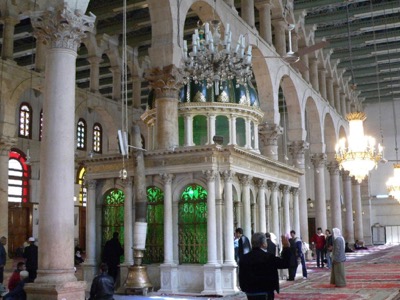Before the war, Syrian society was organised in a secular manner, in order to allow cohabitation between the many religious groups which compose it. All Syrians have suffered from the atrocities committed by the jihadists (for which the Europeans today blame the Syrian Arab Republic). Many of the victims turned to God. Religious practice has risen from approximately 20 % to 80 %. The Christian community faithful to Rome has mostly emigrated, while the Orthodox Christians have stayed. Sunni Muslims are now even more strongly in the majority. Paradoxically, some of their Imams, forgetting the rhetoric of Daesh and ignoring the resistance of the country, today define secularists as their enemies.
Sunni General Hassan Turkmani had imagined defending Syria by counting on its inhabitants [1]. According to him, it was possible to take care of one another and to involve each community, with its own particular cultural relations, in the defence of the country.
This was just a theory, but we have been able to verify that it was correct. Syria has survived assaults by the most massive coalition in human History, just as during the Roman era, it survived the Punic Wars.
« Carthago delenda » (Carthage must be destroyed) [2]), said Cato. « Bachar must go! » echoed Hillary Clinton.
Those who still hope to destroy Syria have now understood that they will first have to crush its religious mosaic. So they vilify the minorities and encourage certain elements of the majority community to impose their cult on others.
It so happens that Syria has a long history of collaboration between religions. In the 3rd century, Queen Septimia Zenobia, who revolted against the Western tyranny of the Roman Empire and took over the leadership of the Arabs of Arabia, Egypt and all of the Levant, made Palmyra its capital [3]. She took care to develop the arts, but also to protect all the religious communities.
In France, during the 16th century, we experienced the terrible wars of religion between two branches of Christianity – Catholicism and Protestantism. This situation ended when philosopher Montaigne managed to imagine interpersonal relations, which allowed everyone to live in peace.
The Syrian project, as described by Hassan Turkmani, goes even further. It is not a question of simply tolerating that others, who believe in the same God, choose to celebrate Him in a different way. It’s about praying with them. So, every day, the head of John the Baptist was venerated in the Umayyad mosque by Jews, Christians and Muslims [4]. It is the only mosque where Muslims have prayed together with a Pope – Jean-Paul II – around their common relics.
In Europe, after the suffering of the two World Wars, priests of the different religions preached that we should fear God here on Earth, and that we would be rewarded in the Beyond [5]. Religious practices have evolved, but the hearts of Mankind have weakened. In fact, God did not send his prophets to threaten us. Thirty years later, the young generation, who wanted to free themselves from these restrictions, suddenly rejected the very idea of religion. Secularism, [6], which was a method of government designed to allow us to live together in the respect of our differences, became a weapon against these differences.
Let’s not commit the same mistake.
The role of religion is not to impose the dictatorship of a way of life, which is what Daesh tried, nor to terrorise our consciences, as the Europeans had tried in the past.
The role of the state is not to arbitrate theological disputes, and even less to choose between religions. As in the West, political parties have aged badly in the Arab world, but as soon as they were created, the Syrian Social Nationalist Party (SSNP) [7] and the Ba’ath Party [8] intended to found a secular state, in other words, one which guarantees, to everyone equally, the freedom celebrate his own cult without fear. That is Syria.
https://www.voltairenet.org/article206501.html
 TheAltWorld
TheAltWorld 

0 thoughts on “Syrian society and secularism”